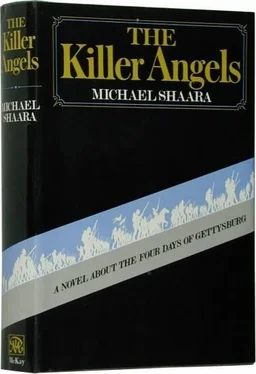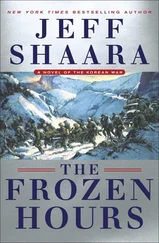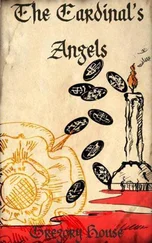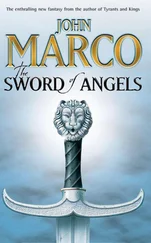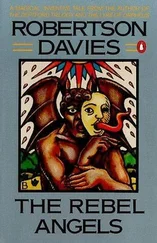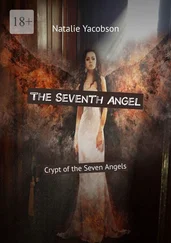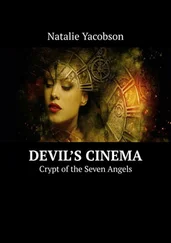Chamberlain closed his eyes and saw it again. It was the most beautiful thing he had ever seen. No book or music would have that beauty. He did not understand it: a mile of men flowing slowly, steadily, inevitably up the long green ground, dying all the while, coming to kill you, and the shell bursts appearing above them like instant white flowers, and the flags all tipping and fluttering, and dimly you could hear the music and the drums, and then you could hear the officers screaming, and yet even above your own fear came the sensation of unspeakable beauty. He shook his head, opened his eyes. Professors’ minds. But he thought of Aristotle: pity and terror. So this is tragedy. Yes. He nodded. In the presence of real tragedy you feel neither pain nor joy nor hatred, only a sense of enormous space and time suspended, the great doors open to black eternity, the rising across the terrible field of that last enormous, unanswerable question.
It was dark around him. There was one small gray area of the sky still aglow in the west; the rest was blackness, and flashes of lightning. At that moment a fine rain began to fall and he heard it come toward him, seeking him in a light patter up the slope. He had dust all over him, a fine pulverized powder from the shelling, dust in his hair and eyes and dust gritty in his teeth, and now he lifted his face to the rain and licked his lips and could taste the dirt on his face and knew that he would remember that too, the last moment at Gettysburg, the taste of raw earth in the cold and blowing dark, the touch of cold rain, the blaze of lightning. After a while brother Tom found him, sitting in the rain, and sat with him and shared the darkness and the rain.
Chamberlain remembered using the boy to plug a hole in the line, stopping the hole with his own brother’s body like a warm bloody cork, and Chamberlain looked at himself. It was so natural and clear, the right thing to do: fill the gap with the body of my brother. Therefore Tom would have to go, and Chamberlain told himself: Run the boy away from you, because if he stays with you he’ll die. He stared at the boy in the darkness, felt an incredible love, reached out to touch him, stopped himself.
Tom was saying, “I guess you got to hand it to them, the way they came up that hill.”
Chamberlain nodded. He was beginning to feel very strange, stuffed and strange.
”But we stood up to them. They couldn’t break us,” Tom said.
”No.”
”Well, nobody ever said they wasn’t good soldiers. Well, they’re Americans anyway, even if they are Rebs.”
”Yes,” Chamberlain said.
”Thing I cannot understand. Thing I never will understand. How can they fight so hard, them Johnnies, and all for slavery?”
Chamberlain raised his head. He had forgotten the Cause. When the guns began firing he had forgotten it completely. It seemed very strange now to think of morality, or that minister long ago, or the poor runaway black. He looked out across the dark field, could see nothing but the yellow lights and outlines of black bodies stark in the lightning.
Tom said, “When you ask them prisoners, they never talk about slavery. But, Lawrence, how do you explain that? What else is the war about?”
Chamberlain shook his head.
”If it weren’t for the slaves, there’d never have been no war, now would there?”
”No,” Chamberlain said.
”Well then, I don’t care how much political fast-talking you hear, that’s what it’s all about and that’s what them fellers died for, and I tell you, Lawrence, I don’t understand it at all.”
”No,” Chamberlain said. He was thinking of Kilrain: no divine spark. Animal meat: the Killer Animals.
Out in the field nearby they were laying out bodies, row after row, the feet all even and the toes pointing upward like rows of black leaves on the border of a garden. He saw again the bitter face of Kilrain, but Chamberlain did not hate the gentlemen, could not think of them as gentlemen. He felt instead an extraordinary admiration. It was as if they were his own men who had come up the hill and he had been with them as they came, and he had made it across the stone wall to victory, but they had died. He felt a violent pity. He said slowly, in memory of Kilrain, “Well, they’re all equal now.”
”In the sight of God, anyways.”
”Yes,” Chamberlain said. “In the sight of God.”
Tom stood up. “Better get moving, Lawrence, there’s a big rain coming.”
Chamberlain rose, but he was not yet ready to go.
Tom said, “Do you think they’ll attack again?”
Chamberlain nodded. They were not yet done. He felt an appalling thrill. They would fight again, and when they came he would be behind another stone wall waiting for them, and he would stay there until he died or until it ended, and he was looking forward to it with an incredible eagerness, as you wait for the great music to begin again after the silence. He shook his head, amazed at himself. He thought: have to come back to this place when the war is over. Maybe then I’ll understand it.
The rain was much heavier now. He put on the stolen cavalry hat and blinked upward into the black sky. He thought: it was my privilege to be here today. He thanked God for the honor. Then he went back to his men.
The light rain went on falling on the hills above Gettysburg, but it was only the overture to the great storm to come. Out of the black night it came at last, cold and wild and flooded with lightning. The true rain came in a monster wind, and the storm broke in blackness over the hills and the bloody valley; the sky opened along the ridge, and the vast water thundered down, drowning the fires, flooding the red creeks, washing the rocks and the grass and the white bones of the dead, cleansing the earth and soaking it thick and rich with water and wet again with clean cold rainwater, driving the blood deep into the earth, to grow it again with the roots toward Heaven.
It rained all that night. The next day was Saturday, the Fourth of July.
”Thus ended the great American Civil War, which must upon the -whole be considered the noblest and least avoidable of all the great mass conflicts of which till then there was record.”
– Winston Churchill,
A History of the
English-Speaking Peoples
In August he asked to be relieved of command. Of the battle he says:
No blame can be attached to the army for its failure to accomplish what was projected by me… I alone am to blame, in perhaps expecting too much of its prowess and valor… could I have foreseen that the attack on the last day would fail, I should certainly have tried some other course… but I do not know what better course I could have pursued.
His request is not accepted, although he cites his poor health, and he serves until the end of the war. He never again attempts a Napoleonic assault. When the war is over, he believes that the issue has been settled by combat, that God has passed judgment. He lays down arms, asks his men to do the same. His great prestige brings a peace, which might not otherwise have been possible. He asks Congress for pardon; it is never given. Dies of heart disease in 1870, perhaps the most beloved General in the history of American war.
That winter he requests relief from command, on the ground that he no longer believes the South can win the war. Lee prevails upon him to stay. He is wounded severely in the Wilderness, 1864, but returns to be Lee’s most dependable soldier, his right hand until the end at Appomattox.
After the war he makes two great mistakes. First, he becomes a Republican, attempts to join with old comrade Grant in rebuilding the South. For this he is branded a turncoat, within two years of the end of the war is being referred to by Southern newspapers as “the most hated man in the South.”
Читать дальше
